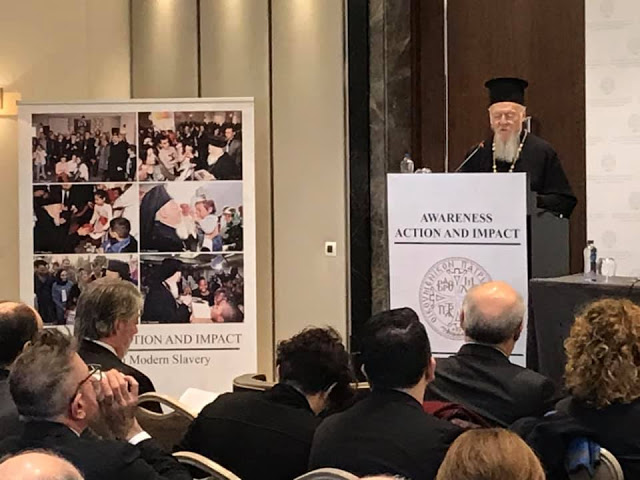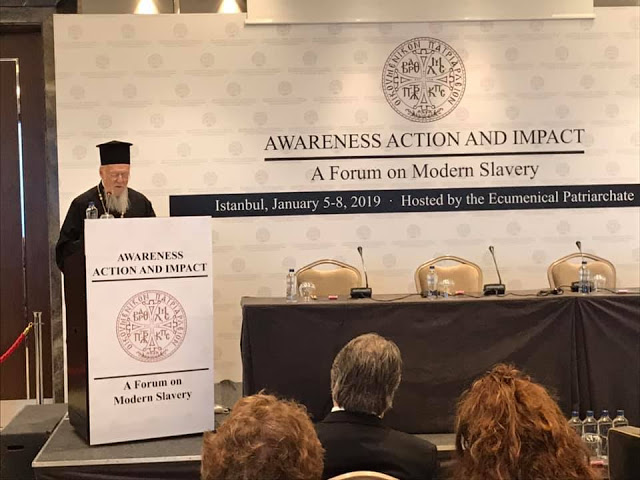
OPENING ADDRESS by His All-Holiness
Ecumenical Patriarch Bartholomew
AWARENESS, ACTION AND IMPACT
A Forum on Modern Slavery (Istanbul, January 7, 2019)
Your Eminences and Excellencies,
Dear representatives of the Presidency of Religious Affairs of Turkey and of the Mufti of Istanbul,
Dear friends,
We welcome and embrace each of you with the blessings and joy of the new year that is upon us, 2019, especially after having celebrated together with many of you here in the Queen of Cities the glorious Feast of Theophany. It is not by accident or coincidence that we gather these days in our historic city, and within the bosom of the Holy Great Church of Christ, the Ecumenical Patriarchate. The dates for our third international Forum on modern slavery were intentionally selected, so that we might be inspired by the afterglow of this sacred period, which marks the beginning of the public ministry of Jesus Christ.
Thus, what this period signifies for all Christians throughout the oikoumene is not exactly a dismantling of older and outdated traditions and customs, but a new message of hope to a world filled with shadows and darkness. Essentially, the message of the Christian Gospel is one of righteousness, equality, justice and truth. And unfortunately for many around the world today, this very message remains to be heard. Christ, Himself, revealed that He was anointed and sent “to preach good news to the poor … to proclaim release to the captives and recovering of sight to the blind, to set at liberty those who are oppressed.” (Lk 4.18) Yet, after many centuries of progress and advancement, we still live in a world where injustice and slavery continue to thrive, where human dignity is exchanged for the sole purpose of greed, gain, and profit. Indeed, the crown of God’s creation, that is, the human person, still suffers and is abused, and is too often seen as merely a commodity. Of course, love is at the core of the Christian faith. As it is widely known, Christians firmly believe that love is to be expressed to the Creator and to all creation. The message of the Gospel is love and, therefore, at the heart of any Christian ministry, there is a commitment to serve those who are suffering and in need. The early Church clearly understood this as well. And since the time of Christ, the indelible mark of Christianity has been written in the history books of the various social movements that have graced this earth over the centuries. The Church Fathers developed fundamental truths about the causes and manner of resolving social problems, injustice, abuse of property, wealth and power, but also about their employment for the good of humanity. They did not place emphasis only on the individual or existential aspects of sin, but also on its implications for society. After all, social problems affect the core of human existence. Human beings do live from bread, even if they do not live from bread alone (Mt 4.4).
As the Holy and Great Council of the Orthodox Church – convened on the island of Crete in June of 2016 – affirmed: “At no time was the Church’s philanthropic work limited merely to circumstantial good deeds toward the needy and suffering, but rather it sought to eradicate the causes which create social problems. The Church’s ‘work of service’ (ἔργον διακονίας) (Eph 4.12) is recognized by everyone” (§19, Encyclical).
The love that Christians not only refer to, then, but also strive for, has been characterized by many saintly men and women through the years. For them, love was not self-centered or viewed in a purely sentimental manner. Love for them was to be sacrificial and unconditional. Love was at the center of their quest for holiness. Love, though, was also fused together with solidarity, because, deep down, they believed that we are all on a common journey, headed toward a common future. Unfortunately, there will always be a need to save those who are oppressed “out of the power of those who plundered them.” (Jd 2.16) In this spirit, our Forum on modern slavery is an extension of the life and work of these holy people, who viewed the struggle for human dignity, freedom, justice and peace as a shared and common struggle.

The common spirit found in the Scriptures or the writings of the Church Fathers is clear. There are many who share this view of a common journey for all of humanity. In the Book of Isaiah, for example, we read the following words: “Wash yourselves; make yourselves clean; remove the evil of your doings from before my eyes; cease to do evil, learn to do good; seek justice, correct oppression; defend the fatherless, plead for the widow.” (Is. 1.16-17) Centuries later, we hear similar words from St. Anthony the Great: “Never prefer gain for yourself over that which is beneficial to your brother.” And others in the fourth century echoed these same sentiments of St. Anthony. St. Basil the Great, for example, wrote: “the world that forgets God, brothers and sisters, is ruled by injustice toward neighbors and inhumanity toward the weak.”
Over the course of history, many have tried to bring real change to society. This Forum is to rectify the direction society is heading in, and to find real and concrete means to fight against this unacceptable expression of abuse and evil in our present day and age. There is no need for us to list facts and figures about the present situations, or reference other religious figures who consider this to be one of the most serious problems we face today. Each day, whether through our televisions, newspapers and magazines, we hear about stories that shock us all, and we can no longer remain idle. We have come together to put our words into action. Silence and passive acceptance of the present situation is no longer possible or acceptable. It never really was anyway.
We often hear people using the term philanthropy unfortunately only in terms of donations, contributions, and bequests. This term, however, which is Greek in origin, also speaks of the love we should have for all of humanity – love for our fellow person. Our love is not to be only for those whom we know, but also for the nameless, the unknown, those who are suffering, especially those trapped in the complex web of slavery. We are called to fulfill an act of natural justice, as we must liberate them from tyranny and exploitation. Our predecessor and great preacher of justice, St. Photios the Great, said the following:
Do not overlook the poor and let not his tattered rags incite you to contempt, but let them rather move you to pity for your fellow creatures. For he is also a man, a creature of God, clothed in flesh like yourself, and perhaps in his spiritual virtue mirroring the common Creator more than you do. Nature has not made him indigent in this life, but it is the tyranny of his neighbor that has reduced either him or his parents to indigence, while our lack of pity and compassion has maintained or even aggravated his poverty.
While the words of St. Photios refer to the poor, they also remind us that the Creator did not give this way of life to His children. The tyranny, cruelty and heartlessness of humanity have created this caste of society, and have enslaved the most innocent, defenseless, and vulnerable in our societies – namely, our women and children.
As we mentioned earlier, words are not enough. Action is required. Thus, in our address to the inaugural Forum on Slavery, entitled “Sins before our Eyes,” held two years ago at this same venue, we highlighted the following:
We unite our efforts to eradicate modern slavery in all its forms, across the world and for all times. We affirm that which we signed in the Declaration of Religious Leaders against Modern Slavery (December 2, 2014), namely that slavery is “a crime against humanity.” We are committed “to do all in our power, within our faith communities and beyond, to work together for the freedom of all those who are enslaved and trafficked so that their future may be restored.” On the way to achieving this categorical imperative, our adversary is not simply modern slavery, but also the spirit that nourishes it, the deification of profit, consumerism, discrimination, racism, sexism, and egocentrism. Against this spirit, we must work for the promotion of a culture of solidarity, respect for others, and dialogue. Together with the sensitization of consciences, we must participate in concrete initiatives and actions. We need stronger mobilization on the level of action.
In addition to our first Forum in Istanbul and our second Forum in Buenos Aires, a local Forum took place at our Parish of Saint Anthony in Pasadena, California, with our blessing and under our guidance. Various religious communities, law enforcement officers, educators, and representatives from various agencies, came together in solidarity and unity to inform and educate the general public. The event was a great success for their greater community, and we congratulate Metropolitan Gerasimos of San Francisco for this initiative. An event like this should serve as an inspiration and model for all our parishes and communities, involving people of all faiths who want to put together similar programs. It is for this reason that the Ecumenical Patriarchate has established a special Task Force on Modern Slavery, which is already working together with our Roman Catholic and Anglican brothers and sisters. But this call to action is not just for the Christian communities. It is a summons to all.
We insist on our firm conviction that Churches and religions can have a crucial contribution to the resolution of all the contemporary social problems and, of course, slavery. Religious faith inspires, strengthens, and supports the struggle for the protection of freedom and justice, even if this struggle seems to be confronted with intractable difficulties and impasses. Christian Churches and other religions can cultivate the spirit of peace, reconciliation and solidarity, not only through the dialogue and cooperation among themselves, but also through the support at the sociopolitical level and in the civic society of all the initiatives and movement for the protection of human dignity and fundamental rights.
With these thoughts, we warmly welcome you once again to the Sacred See of the Ecumenical Patriarchate and wish you successful deliberations and constructive results for this significant gathering about the burning issue of modern slavery, which in fact contradicts all the major humanistic achievements of modernity and the core values of Christianity.
Thank you for your attention.
